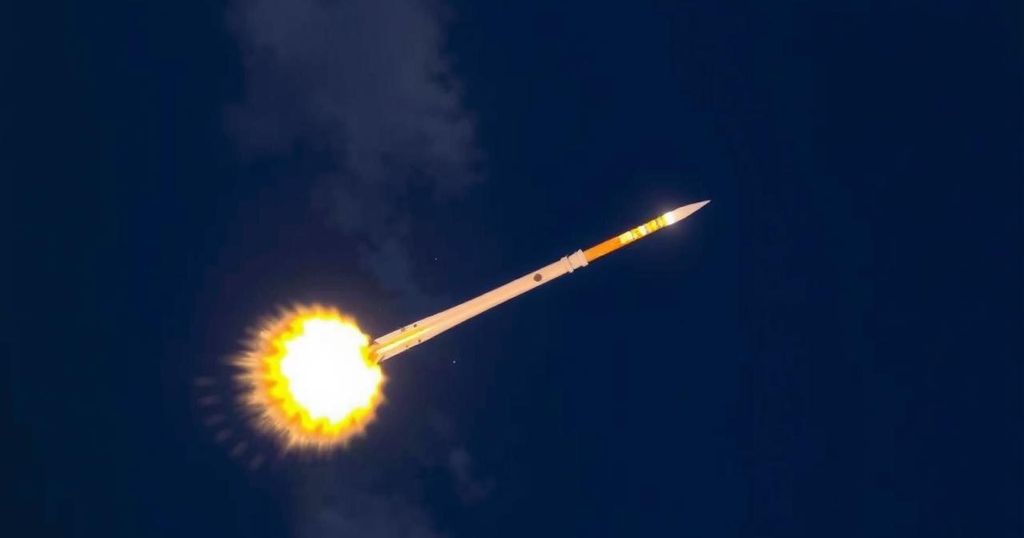North Korea Conducts New ICBM Test: A Show of Military Might Ahead of U.S. Elections
North Korea launched a new, potentially more agile intercontinental ballistic missile (ICBM) capable of reaching the U.S. mainland, marking its first test in nearly a year. Kim Jong Un characterized the launch as necessary to demonstrate military readiness against threats. The action drew condemnation from the U.S., South Korea, and Japan amid concerns about North Korean troop movements towards Ukraine. Experts assert that despite advancements in missile technology, a functioning nuclear-armed missile capable of striking the U.S. mainland remains unproven.
On Thursday, North Korea executed a significant military maneuver by launching a new intercontinental ballistic missile (ICBM), which is perceived to be more agile and capable of threatening the U.S. mainland. This test marks the first in almost a year, occurring in proximity to the upcoming U.S. elections. Reports indicate that North Korean leader Kim Jong Un was present for the launch and characterized the event as “an appropriate military action” intended to affirm the nation’s preparedness to counteract perceived threats to its security. The United States, South Korea, and Japan responded promptly, denouncing the missile launch as a destabilizing action that escalates regional tensions. As tensions mount, the U.S. has indicated that North Korean troops, donned in Russian uniforms, are reportedly being dispatched to Ukraine to support Russian efforts in the ongoing conflict there. North Korea quickly confirmed the details of this launch, which was noteworthy due to its swift public acknowledgment—an unusual practice for the regime. While specifics regarding the missile remain limited, it is suggested that the ICBM could be solid-fueled, allowing for improved mobility, concealment, and rapid launch capabilities compared to traditional liquid-fueled missiles. Additionally, the missile reportedly achieved a longer flight duration of 86 minutes and reached an altitude exceeding 4,350 miles, indicating advancements in its missile technology. In response to the launch, the U.S. National Security Council condemned it as a “flagrant violation” of various U.N. Security Council resolutions, stressing the need to ensure the security of the U.S. and its allies. Coordination between South Korea, Japan, and the U.S. is underway to develop adequate military exercises aimed at countering North Korean threats. South Korean military analysts speculate that the missile may have utilized a newly disclosed 12-axle launch vehicle, indicating a potential upgrade to North Korea’s ICBM capabilities. Despite these advancements, many experts contend that North Korea has not yet successfully developed a nuclear-armed missile capable of reaching the U.S., given the technological barriers related to atmospheric reentry dynamics. This recent test, which was conducted at a high angle, does not lend itself to evaluating reentry conditions, raising questions about North Korea’s future testing strategies. Furthermore, intelligence reports suggest that North Korea may be on the brink of a seventh nuclear test.
The recent missile test by North Korea highlights the ongoing tensions in the region as the regime continues to advance its military capabilities. The development and testing of intercontinental ballistic missiles represent a significant threat to international security, particularly concerning the United States and its allies in Asia. North Korea’s ties to Russia, especially in the context of the Ukraine conflict, add another layer of complexity to its military ambitions and geopolitical strategy. As North Korea refines its missile technology, global powers remain vigilant, coordinating efforts to prevent further destabilization.
In conclusion, North Korea’s latest intercontinental ballistic missile launch underscores its continued commitment to advancing its military capabilities amid escalating regional tensions. The quick acknowledgment of the test by North Korea marks a shift in its communication strategy and reflects an assertive stance towards perceived threats. As the international community reacts with condemnation and coordinated military plans, the broader implications of North Korea’s actions in relation to its potential involvement in the conflict in Ukraine also warrant close attention. The prospects for peace and stability in the region remain precarious as North Korea navigates its ambitions alongside geopolitical dynamics with Russia and the West.
Original Source: www.cbsnews.com




Post Comment